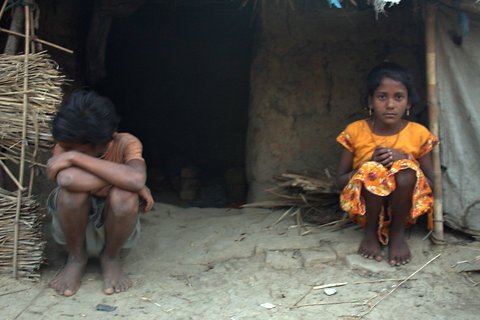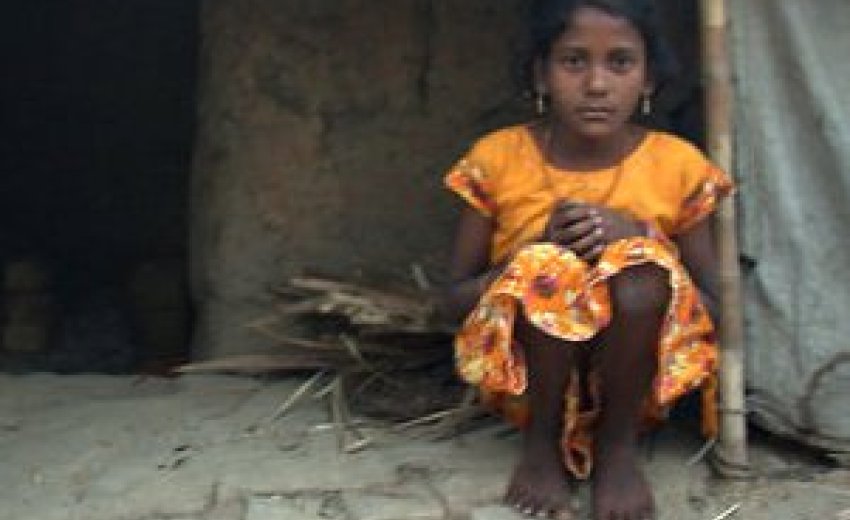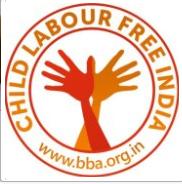 |
| Sonia Faleiro for The New York Times 10-year-old Meena Devi, right, and her older brother Sunil, 11, outside their hut in Jhanwatola village, Bihar. |
Meena Devi is unlike any little girl you will ever meet. In many ways, she isn’t even a child. The afternoon we met, she’d cooked lunch for two of her siblings. “I made dal bhat tarkari,” she said proudly, referring to a local dish of rice, lentils and seasonal vegetables. “But we are out of dal, so really, it was just bhat tarkari.” Meena also washes her siblings’ clothes and hustles them off to school every morning.
There are two things that make this daily routine extraordinary. First, Meena, with her bright eyes and neatly combed bob, is only 10 years old. And second, she’s an orphan.
Meena and her siblings — 11-year-old Sunil and 6-year-old Leela — live without any adult supervision. Their hut is pitiful even by the standards of Jhanwatola village in the northern Indian state of Bihar, a state known primarily for its impossible poverty. Entire villages in Bihar have no roads and no running water for miles, and Jhanwatola, with its cramped little mud huts, is no exception. Villagers know of electricity as an abstract concept rather than a modern-day essential.
The children have been living like this for almost three years. They have an elder brother, Anil, who lives in another state. In this time they haven’t received a single visit from anyone associated with the local district, Nalanda, or the state government.
On an average day not one adult enters the hut. If they did, here’s what they’d find: a fire pit, a few utensils, a handful of worn clothes, two schoolbags and a plastic jar partly filled with grain. There is nothing to sit on, there isn’t a piece of cloth to lie on, and in a state in which summer temperatures average 45 degrees centigrade (113 degrees Fahrenheit), there are no windows.
Almost three years ago, on Aug. 8, 2009, Meena’s mother, Phoolmanti Devi, died of starvation. When the neighbors came for her, they found at her breast her 1-year-old son, Sarvan Majhi, also dead. Meena’s father had died previously of natural causes, and her mother alone had supported Anil, Sunil, Meena, Leela and Sarvan.
Mrs. Devi was a daily wage agricultural laborer, but heavy monsoon rains in the days just prior to her death had impeded fieldwork, thrusting unemployment upon her. With no money for food, Mrs. Devi, recalled Meena, would walk from one end of the village to the next on her hands and knees, digging out fallen bits of grain. These she brought home to boil.
The rain escalated, and Jhanwatola, which is off the main road on downward sloping land, began to flood. Mrs. Devi and her five children were trapped in their hut for three days without food and with very little water. On the third night, Mrs. Devi and her youngest child died.
The cause of Mrs. Devi’s death surprised no one in the village. The nearly 1,000 residents of Jhanwatola are of the Dalit caste, and their difficult, marginalized lives embody the word Dalit, which means “ground down.”
A small handful of villagers own land, and some others work on land they lease for money and grain. But the majority are landless laborers who have it the worst, as they are prey to the whims of their upper caste employers, who pay them only in grain, never money. To earn cash, entire families including women and children as young as 5 find supplemental work in one of the district’s many brick kilns. Their poverty and great numbers have kept wages low, and over the years more and more villagers have found it preferable to head off to neighboring states, even as far north as Delhi and Haryana, to work on construction sites and kilns, fields and rice mills. Many such villagers are youngsters cursed with an adult’s sense of responsibility. They go because otherwise they and their family will starve.
Since 2009, one of these children has been Meena’s oldest brother, Anil, who, at the age of 14, works full time at a brick kiln in Ranchi, the capital of the neighboring state of Jharkhand. Meena last saw Anil six months ago. He calls on her aunt’s phone, she said, and sends money whenever he can. “He sent 100 rupees ($1.77) last month,” she said, “so I bought spices, tea and soap.”
Meena’s aunt, Lata Devi, lives close by, and she’ll sometimes send food over for the three children. But she has a family of four and finds it hard to make ends meet herself. It was her idea that Anil go to work. “A thekedar, labor contractor, had come to the village, as they often do,” said Mrs. Devi. “So we sent Anil off. He’s a grown up boy after all. If he won’t look after his brothers and sisters, who will?”
Meena and her siblings go to school every morning, and the free, hot midday meal they receive there helps sustain them. When they return, they wander around the village looking for ways to entertain themselves. “If there’s food to cook, I cook it,” said Meena. “Otherwise we play.”
The story of Phoolmanti Devi’s death was first reported in Aug. 2009 in the Hindi-language press by Vijay Prakash, a full-time farmer and part-time reporter who is from one of the few better-off families in Jhanwatola. He says that the village, and in fact Nalanda district at large, is decaying from its inability to handle the problem of the “four B’s”: bemar, berozgar, buddhe and bachche. (Illness, unemployment, the elderly and children).
His report caught the eye of Mokhtarul Haque, who works with the Bihar office of the nationwide children’s rights nonprofit, Bachpan Bachao Andolan. Mr. Haque, who facilitates the rescue of child laborers, is raising money to send Meena and her siblings to boarding school. He estimates a monthly expense of 6000 rupees ($106) for all four children.
If Meena isn’t rescued from Jhanwatola, he said, there’s really only one way this story will end.
“Thekedars already know the village and regularly hire children for hard labor,” said Mr. Haque, “But it’s different for girls. Sometime in the next couple of years, while she’s still a child, a thekedar may masquerade as an eligible groom and trick Meena’s aunt into letting him marry Meena, and once she does he’ll take her to Delhi and sell her off to a brothel or to an employment agency that will hire her out as a domestic worker, and she’ll be treated like a slave. But she’s so vulnerable, so poor, that perhaps he won’t even have to pretend. He’ll just whisk her away one night, and no one will notice, and by the time they do, she’ll have vanished forever.”
Support Bachpan Bachao Andolan (BBA/ Save the Childhood Movement)

